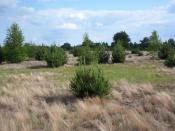An Introduction to Ecology and the Biosphere
The Scope of Ecology
I. Ecology (Greek)
A. Scientific study of the interactions between organisms and their environment
B. Involve organisms with open systems
C. Naturalists made the process of observing and describing organisms in their natural habitats an end in itself
D. Becoming increasingly experimental
E. Rapidly growing and exciting science due to field experiments
II. The interactions between organisms and their environment determine the distribution and abundance of organisms
A. Ecologists use observations and manipulative experiments to test hypotheses
B. Sophisticated computer programs develop models that predict the effects that human activities will have on a climate and how the resulting climatic changes will affect geographic distribution
C. Some environments of organisms include abiotic components, which are nonliving and physical factors (temp., light, water)
D. Some environments of organisms include biotic components, which are all the organisms that are part of any individual's environment
E. Other organisms compete for food and resources, prey upon it, or change its environment
III. Ecology and evolutionary biology are closely related sciences
A. Geographic distribution of organisms and their exquisite adaptations to specific environments provided Darwin with evidence for evolution
B. An important cause of evolutionary change is the interaction of organisms with their environment
C. Events that occur in the framework of ecological time (minutes, months, years) translate into the effects over the longer scale of evolutionary time (decades, centuries, millennia, and longer)
IV. Ecological research ranges from the adaptations of individual organisms to the dynamics of the biosphere
A. Four levels of ecological study: organismal, population, community, and ecosystem
B. Organismal ecology is concerned with the morphological, physiological, and behavioral ways in which individual organisms meet the challenges posed by the way their biotic and abiotic environments
C. Population ecology concentrates mainly on...


